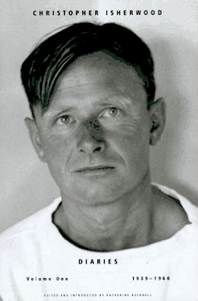A WRITER'S WIT |
My Book World

First of all, these diaries are beautifully and ably edited by Katherine Bucknell, providing a fascinating introduction of over fifty pages. In addition to the journals themselves, Bucknell provides an Isherwood chronology, glossary, and index at the end. She divides the journal into three parts: The Emigration, January 19,1939–December 31, 1944; The Postwar Years, January 1, 1945–April 13, 1956; and The Late Fifties, April 14, 1956–August 26, 1960. The voice of Isherwood evolves from that of a solid mid-career writer to that of an “emeritus professor,” beginning his senior years with as many projects as he can handle.
I’ve always felt a certain affinity for writer Christopher Isherwood (born in Wyberslegh Hall, High Lane, Cheshire, England) 1904-1986, for a number of reasons. Largely because he is one of the first important writers of his generation to write fiction with gay characters—with gay love lives, as if it is a normal situation (and it is)—I’ve looked to his writing for a certain guidance. Through his well-traveled life he demonstrates a certain brand of courage. He never seems to hide who he is from the world at large—even the Hitler’s Gestapo as he lives in Berlin in his twenties. He doesn’t marry a woman as cover, as many of his colleagues and friends do. He openly loves and shares a domestic life in a major way with at least two men, three, if you count one relationship that is rather ill-fated. The latter one, his partnership with artist Don Bachardy, thirty years his junior, endures from 1953 until Isherwood’s death in 1986.
I also feel "close" to Isherwood because of the career he chooses, one that is rather skin-of-your-teeth at times. He writes the projects he wants to, not the ones that necessarily earn him the most money. Granted, he does work in Hollywood, writing and co-writing screenplays for any number of films. Even with regard to these, he seems to turn down the less interesting projects or the ones in which he knows working with certain personalities will be difficult. He lives by his wits but also by a strong artistic intuition, and by his own well-honed critical skills. Seems that he is seldom wrong in assessing the work of others, and his own, as well. Through reading this 1050 page document, I’ve attained yet another view of Christopher Isherwood, and that is as human being. At one point, in the 1950s, he and Bachardy have around $6,000 in the bank (a little over $50,000 in today’s currency). You can’t get more skin-of-your-teeth than that.
Isherwood begins keeping diaries when he is twenty; however, those written prior to this time he himself destroys. He is in his mid-thirties when he begins keeping the series of diaries that are featured in this volume. It is also at this time that he begins publishing, in particular, the novel, Mr. Norris Changes Trains. This volume of diaries is a blend of many features.
Isherwood writes of his daily travails with lovers, physical ailments, which seem to grow in number as he ages, tussles with film studios, accounts of social events, both formal and informal. From the limited amount of Isherwood’s fiction that I’ve read (The Berlin Stories, Down There on a Visit, and A Single Man), I wouldn’t expect to encounter a person encumbered with a number of insecurities: his health, his weight, his looks, his mostly tentative drug use (he has a real penchant for mescaline), alcohol consumption, driving, finances. Yet you name it, and he seems to fret over it. Daily. At the same time, there emerges from these journals a man who is quite serious about his work. I paraphrase some of his oft-repeated wording: Didn’t write today. Too hung over from last night’s party. Wrote four pages on novel today. Want to write 100 pages by my birthday. He is as critical of his own work, when it doesn’t come together, as he is of others’. He lives for his art. Even in his fifties, to insure an income, he accepts film writing offers and part-time teaching opportunities at various colleges and universities in the Los Angeles area, where he chooses to make his home following his naturalization as a US citizen. In fact, an important part of each entry seems to be a report of the weather (again paraphrased). Went to the beach today. It was hot. It was cold. Still hot. Still foggy. Absolutely gorgeous. These comments could well be representative of his internal weather. At any rate, the Diaries provide any writer with plenty of positive and negative examples of how to be successful writer.

Date of Original Post:
11/13/14 — Introduction to My Long-Playing Records
11/20/14 — "My Long-Playing Records" — The Story
11/27/14 — "A Certain Kind of Mischief"
12/04/14 — "Ghost Riders"
12/11/14 — "The Best Mud"
12/18/14 — "Handy to Some"
12/25/14 — "Blight"
01/01/15 — "A Gambler's Debt"
01/09/15 — "Tales of the Millerettes"
01/15/15 — "Men at Sea"
01/22/15 — "Basketball Is Not a Drug"
01/29/15 — "Engineer"
02/05/15 — "Snarked"
02/12/15 — "Killing Lorenzo"
02/19/15 — "The Age I Am Now"
02/26/15 — "Bathed in Pink"
Listen to My Long-Playing Records Podcasts:
03/12/15 — "A Certain Kind of Mischief"
03/26/15 — "The Best Mud"
04/02/15 — "Handy to Some"
04/09/15 — "Tales of the Millerettes"
04/16/15 — "Men at Sea"
04/23/15 — "My Long-Playing Records"
04/30/15 — "Basketball Is Not a Drug"
05/07/15 — "Snarked"
05/21/15 — "Killing Lorenzo"
05/28/15 — "Bathed in Pink"
Also available on iTunes. Watch for more podcasts!


 RSS Feed
RSS Feed